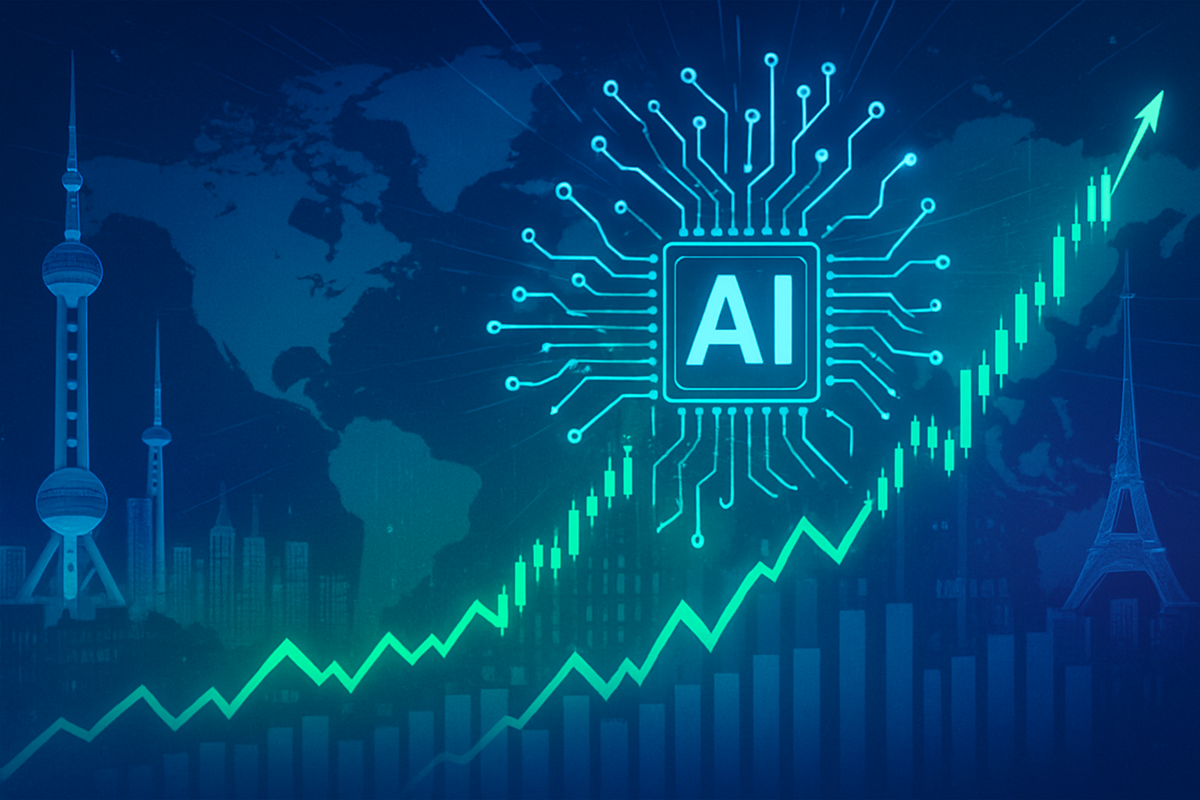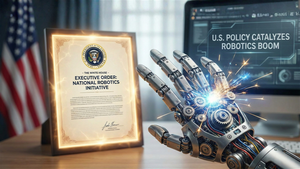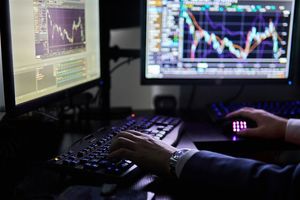Financial News
AI Optimism Ignites Global Tech Rally: Nvidia and OpenAI News Propel Asian and European Markets

Optimism surrounding Artificial Intelligence (AI) investments has sent a palpable buzz through global financial markets today, propelling key technology stocks and indices in Asia and Europe to impressive gains. The driving force behind this surge is fresh news from industry titans Nvidia and OpenAI, signaling a deepening commitment to AI infrastructure that is reshaping investor sentiment and capital allocation worldwide. From the semiconductor foundries of Taiwan to the bustling exchanges of Seoul and the tech hubs of Europe, the AI revolution is demonstrably translating into significant market movements.
Taiwan's semiconductor giant, Taiwan Semiconductor Manufacturing Company (NYSE: TSM, TWSE: 2330), soared over three percent, while South Korea's benchmark Kospi index also saw a significant rise. This momentum was mirrored in Europe, where a tech-led rally underscored the global reach of AI's influence. This event marks a pivotal moment, highlighting the market's conviction in AI's transformative power and its immediate financial implications across diverse economies.
What Happened and Why It Matters: A Tidal Wave of AI Investment
The recent market euphoria stems largely from a landmark announcement: Nvidia (NASDAQ: NVDA), the undisputed leader in AI chip manufacturing, revealed a colossal $100 billion investment plan in OpenAI to construct advanced AI data centers. This monumental commitment, designed to deliver cutting-edge data center processors and deploy vast computing power, sent immediate "shockwaves" through global chip markets. The sheer scale of this investment—equivalent to powering 4-5 million graphics processing units (GPUs)—underscores the industry's belief in AI's future and its insatiable demand for processing power.
This news directly benefited companies integral to Nvidia's supply chain. Taiwan Semiconductor Manufacturing Company (NYSE: TSM, TWSE: 2330), a crucial fabricator of Nvidia's advanced chips, saw its shares climb by 3.5% in Taipei trading. This surge reflects market expectations of increased production orders for TSMC, which is already developing six new products for Nvidia, including advanced CPUs and GPUs essential for AI applications. The company's shares reached a record NTD 1,340, signaling robust investor confidence in its pivotal role in the AI ecosystem.
In South Korea, the benchmark Kospi index hit record highs, extending a significant winning streak, primarily due to the rally in chipmakers. Samsung Electronics Co. Ltd. (KRX: 005930, LON: 0593xq, OTCMKTS: SSNLF) saw its shares rise after reportedly passing Nvidia's qualification tests for its high-bandwidth memory (HBM3E) chips, crucial components for AI accelerators. Foreign investors have significantly increased their holdings in Samsung, reaching 2025 highs. Similarly, SK Hynix, another major memory chip giant, surged by over 2.5%, reaching a record high as investors recognized the massive demand for high-bandwidth memory required by AI infrastructure. The AI optimism also positively impacted Europe, particularly among chip equipment manufacturers like ASML Holding N.V. (NASDAQ: ASML, XAMS: ASML), a critical supplier of photolithography equipment, which is poised to benefit from increased demand from foundries like TSMC.
The underlying reasons for this widespread optimism are multifaceted. AI is increasingly viewed as the "productivity technology of the future," capable of dramatically reducing costs, streamlining operations, and unlocking unprecedented efficiency across industries. Morgan Stanley projects AI could add between $13 trillion and $16 trillion in value to the stock market, with a significant boost to S&P 500 earnings. Furthermore, AI is expected to generate entirely new revenue streams beyond the technology sector, impacting healthcare, finance, manufacturing, and more. This paradigm shift, validated by substantial investments from industry leaders, solidifies the belief that the AI boom is a fundamental reshaping of market valuations and investment strategies.
The AI Ripple: How This Event Might Affect the Market
The immediate effect of this AI-driven surge has been a "broad market" rally, characterized by record-setting stock performance and buoyant investor sentiment. Asian stock markets have reached new heights, and the South Korean Kospi index has extended its longest winning streak in years. This wave of optimism is attracting significant capital flows into the technology sector, particularly into companies at the forefront of AI hardware and infrastructure. The market is increasingly valuing companies based on their potential to leverage or contribute to the AI revolution, leading to shifts in portfolio allocations and trading strategies.
However, this rapid ascent also brings a degree of caution. Some analysts are beginning to voice concerns about the possibility of a "bubble" forming, noting that valuations for certain AI-related shares appear "inexplicably high" relative to expected profit growth. This intense capital expenditure, while necessary for building out AI infrastructure, could also lead to speculative excesses. Investors are grappling with distinguishing between sustainable growth driven by fundamental AI adoption and speculative trading based on hype. The increased focus on AI is also redefining what constitutes a "tech stock," as companies across various sectors announce AI integration plans, leading to a broader re-evaluation of market segments.
The market's reaction underscores a significant shift in investment priorities. Companies that can demonstrate a clear path to integrating AI into their products and services, or those that provide the foundational technology for AI, are seeing their market capitalizations swell. Conversely, firms perceived as lagging in AI adoption or those whose business models might be disrupted by AI could face increased scrutiny and potentially see their valuations decline. This dynamic is fostering a highly competitive environment where innovation in AI is directly correlated with market success, prompting a scramble among companies to acquire AI talent, develop new solutions, and secure their position in the evolving landscape.
Broader Implications: Reshaping Industries and Beyond
This AI-driven market surge is not merely a fleeting trend; it represents a deeper integration of AI into global economic structures, fitting squarely into broader industry trends of digital transformation and automation. The significant investments in AI data centers signal an acceleration of this shift, pushing companies across all sectors to evaluate how AI can enhance their operations, customer engagement, and product development. The ripple effects are profound: increased demand for specialized hardware like advanced GPUs and HBM chips, a boom in AI software and services, and a heightened need for data scientists and AI engineers.
Competitors, both large and small, are facing immense pressure. For established tech giants, the challenge is to innovate rapidly and integrate AI without disrupting existing revenue streams. For smaller, agile AI startups, this environment presents opportunities for rapid growth, strategic partnerships, or even acquisitions by larger players seeking to bolster their AI capabilities. This competitive landscape will likely lead to further consolidation in certain segments of the AI market, while also fostering the creation of entirely new niches and specialized services.
Beyond the immediate market and competitive dynamics, there are significant regulatory and policy implications. As AI becomes more pervasive, governments and international bodies will increasingly grapple with questions surrounding data privacy, algorithmic bias, intellectual property rights for AI-generated content, and the ethical deployment of autonomous systems. We can anticipate new regulations and frameworks emerging to govern AI development and deployment, which could impact innovation, market access, and global competitiveness. Historically, major technological shifts, from the industrial revolution to the internet boom, have always necessitated new regulatory paradigms, and AI is proving to be no exception. While comparisons to past bubbles like the dot-com era are inevitable, AI's fundamental impact on productivity and its potential to solve complex global challenges suggest a more enduring and transformative influence.
What the Reader Should Pay Attention to Next
Looking ahead, investors and market observers should pay close attention to several key indicators. In the short term, upcoming quarterly earnings reports from major technology companies, particularly those heavily invested in AI, will provide crucial insights into the profitability and scalability of current AI initiatives. Any further investment announcements or strategic partnerships in the AI space will continue to fuel market sentiment. Geopolitical factors, especially concerning semiconductor supply chains and technological competition between global powers, will also remain critical, potentially influencing the availability and cost of essential AI components.
In the long term, the focus will shift to the tangible advancements in AI models and their real-world applications. Beyond the hype, the market will seek evidence of how AI is genuinely transforming industries, creating new business models, and generating sustainable revenue streams. The ethical considerations surrounding AI, including issues of bias, transparency, and job displacement, will also become increasingly prominent, potentially influencing public perception and regulatory responses. The competitive landscape will continue to evolve, with new entrants challenging established players and unexpected alliances forming.
Readers should also monitor how companies not directly involved in AI hardware are strategically integrating AI into their operations. This includes traditional industries adopting AI for efficiency gains, personalized customer experiences, or predictive analytics. Identifying these indirect beneficiaries of the AI boom could uncover new market opportunities. Conversely, understanding the potential challenges—such as the risks of overvalued assets or the capital intensity required for AI development—will be crucial for informed investment decisions. The interplay between technological innovation, market dynamics, and regulatory frameworks will shape the trajectory of this AI-powered era.
Conclusion: A New Era of Market Dynamics
The current surge in Asian and European technology stocks, ignited by the optimism surrounding AI investments from giants like Nvidia and OpenAI, marks a significant moment in financial history. It underscores the market's profound belief in AI as a powerful, transformative force capable of reshaping industries, driving unprecedented productivity gains, and unlocking vast new revenue streams. The substantial capital flowing into the semiconductor and AI infrastructure sectors is a testament to this conviction, with companies like TSMC, Samsung Electronics, SK Hynix, and ASML emerging as key beneficiaries.
Moving forward, the market will likely experience continued volatility as it navigates the balance between speculative excitement and the tangible, long-term growth potential of AI. While concerns about potential bubbles are valid and warrant careful consideration, the underlying technological advancements and the sheer scale of investment suggest a more enduring impact than previous tech booms. Investors should remain vigilant, focusing on companies demonstrating sustainable growth, clear pathways to profitability from their AI endeavors, and robust governance around AI development.
The coming months will be critical for observing how AI's promise translates into real-world applications and bottom-line results. The evolution of regulatory landscapes, the emergence of new market leaders, and the sustained integration of AI across diverse economic sectors will define this new era of market dynamics. Understanding these nuances will be key for investors seeking to capitalize on, and navigate the challenges of, the AI revolution.
This content is intended for informational purposes only and is not financial advice
More News
View More




Recent Quotes
View More
Quotes delayed at least 20 minutes.
By accessing this page, you agree to the Privacy Policy and Terms Of Service.



